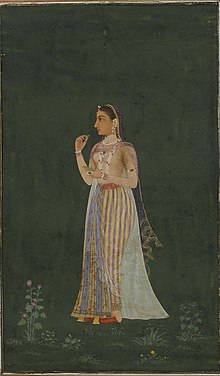
Back جهنرا بيغوم Arabic জাহানাৰা বেগম Assamese جهانآرا بیگم AZB জাহানারা বেগম সাহিব Bengali/Bangla Jahanara Begum Catalan Džahanara Begum Czech Jahanara Begum German Jahanara Begum Spanish Jahanara Begum Basque جهانآرا بیگم Persian
| Jahanara Begum | |||||
|---|---|---|---|---|---|
| Shahzadi of the Mughal Empire | |||||
 Begum aged 18, painting dated 1632 | |||||
| Padshah Begum | |||||
| 1st reign | 17 June 1631 – 31 June 1658 | ||||
| Predecessor | Mumtaz Mahal | ||||
| Successor | Roshanara Begum | ||||
| 2nd reign | 1669 – 16 September 1681 | ||||
| Predecessor | Roshanara Begum | ||||
| Successor | Zinat-un-Nissa | ||||
| Born | 23 March 1614[1] Ajmer, Mughal Empire | ||||
| Died | 16 September 1681 (aged 67) Delhi, Mughal Empire | ||||
| Burial | Nizamuddin Dargah, Delhi | ||||
| |||||
| House | Timurid | ||||
| Father | Shah Jahan | ||||
| Mother | Mumtaz Mahal | ||||
| Religion | Sunni Islam | ||||
Jahanara Begum (23 March 1614 – 16 September 1681) was a princess of the Mughal Empire. She was the second and the eldest surviving child of Mughal Emperor Shah Jahan and Mumtaz Mahal.
After Mumtaz Mahal's untimely death in 1631, the 17-year-old Jahanara was entrusted with the charge of the royal seal and conferred the title of Padshah Begum (First lady) of the Mughal Empire, despite the fact that her father had three surviving wives. She was Shah Jahan's favorite daughter and she wielded major political influence during her father's reign, and has been described as "the most powerful woman in the empire" at the time.[2]
Jahanara was an ardent partisan of her brother, Dara Shikoh, and supported him as her father's chosen successor. During the war of succession which took place after Shah Jahan's illness in 1657, Jahanara sided with the heir-apparent Dara and joined her father in Agra Fort, where he had been placed under house arrest by Aurangzeb. A devoted daughter, she took care of Shah Jahan till his death in 1666. Later, Jahanara reconciled with Aurangzeb who gave her the title 'Empress of Princesses' and replaced her younger sister, Princess Roshanara Begum, as the First Lady.[3] Jahanara died during Aurangzeb's reign. She is known for her written works as well, which continues to be a primary way in which her presence in Sufism survives into today. She is well known for a biography of Sheikh Mu’in ad’-Din Chishti, ‘Munis al arwah’ who she believed to have been the highest of the Sufi saints in India and her master, despite his life being four centuries before hers.[4]
- ^ Lal, K.S. (1988). The Mughal harem. New Delhi: Aditya Prakashan. p. 90. ISBN 9788185179032.
- ^ ASHER, CATHERINE; Asher, Catherine Ella Blanshard; Asher, Catherine Blanshard; Asher, Catherine B. (1992). Architecture of Mughal India. Cambridge University Press. p. 265. ISBN 9780521267281.
- ^ Preston, page 285.
- ^ Lambert-Hurley, Siobhan (2022). Three Centuries of Travel Writing By Muslim Women. Bloomington: Indiana University Press.
© MMXXIII Rich X Search. We shall prevail. All rights reserved. Rich X Search